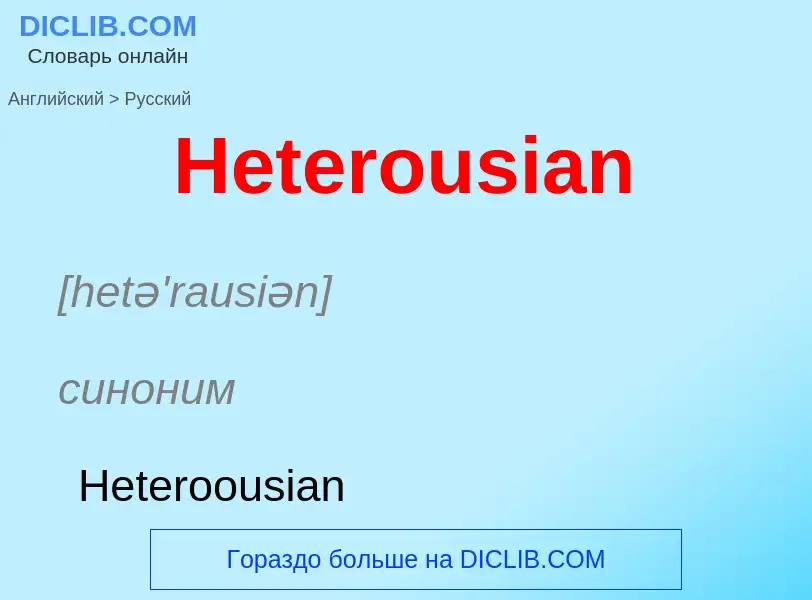Μετάφραση και ανάλυση λέξεων από τεχνητή νοημοσύνη
Σε αυτήν τη σελίδα μπορείτε να λάβετε μια λεπτομερή ανάλυση μιας λέξης ή μιας φράσης, η οποία δημιουργήθηκε χρησιμοποιώντας το ChatGPT, την καλύτερη τεχνολογία τεχνητής νοημοσύνης μέχρι σήμερα:
- πώς χρησιμοποιείται η λέξη
- συχνότητα χρήσης
- χρησιμοποιείται πιο συχνά στον προφορικό ή γραπτό λόγο
- επιλογές μετάφρασης λέξεων
- παραδείγματα χρήσης (πολλές φράσεις με μετάφραση)
- ετυμολογία
Heterousian - translation to ρωσικά
[hetə'rausiən]
синоним
[het(ə)rəu'ausiən]
прилагательное
религия
иносущный
существительное
[het(ə)rəu'ausiən]
религия
арианин (человек, отрицающий догмат о единосущности бога-отца и бога-сына)
Ορισμός
Βικιπαίδεια
In 4th-century Christianity, the Anomoeans , and known also as Heterousians , Aetians , or Eunomians , were a sect that upheld an extreme form of Arianism, that Jesus Christ was not of the same nature (consubstantial) as God the Father nor was of like nature (homoiousian), as maintained by the semi-Arians.
The word "anomoean" comes from Greek ἀ(ν)- (an-) 'not' and ὅμοιος (omoios) 'similar': "different; dissimilar". In the 4th century, during the reign of Constantius II, this was the name by which the followers of Aëtius and Eunomius were described. The term "heterousian" derives from the Greek ἑτεροούσιος, heterooúsios, "differing in substance" from ἕτερος, héteros, "another" and οὐσία, ousía, "substance, being".
The semi-Arians condemned the Anomoeans in the Council of Seleucia, and the Anomoeans condemned the semi-Arians in their turn in the Councils of Constantinople and Antioch; erasing the word ὅμοιος (omoios) from the formula of Rimini and that of Constantinople and protesting that the Word had not only a different substance but also a will different from that of the Father. From that, they were to be called ἀνόμοιοι (anomoioi).
In the 5th century, the Anomoean presbyter Philostorgius wrote an Anomoean church history.

![[[Eunomius of Cyzicus]], from the [[Nuremberg Chronicle]] [[Eunomius of Cyzicus]], from the [[Nuremberg Chronicle]]](https://commons.wikimedia.org/wiki/Special:FilePath/Eunomius from Nuremberg Chronicle.jpg?width=200)
